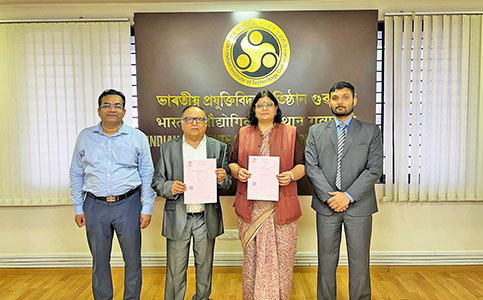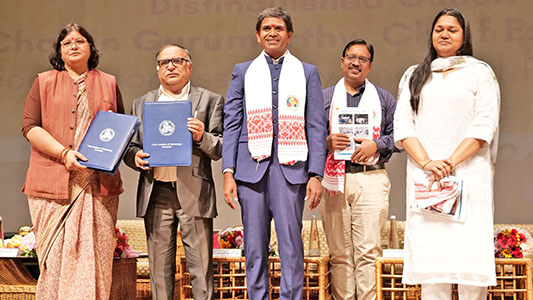New Delhi: Electronics Sector Skills Council of India (ESSCI) proudly unveils a momentous leap forward in its relentless pursuit of skill development and innovation within the semiconductor domain. In a historic move, ESSCI has inked a game-changing Memorandum of Understanding (MoU) with the esteemed Indian Institutes of Technology (IIT) Guwahati and Ropar. This visionary collaboration is poised to ignite a revolution, fostering a dynamic ecosystem primed for skill enhancement, innovation acceleration, and the flourishing of semiconductor startups.

This MoU aims to train not only students from Indian Institutes of Technology (IITs) but also aspiring engineers from diverse academic backgrounds in various job roles crucial for the semiconductor industry. It will play a crucial role in providing skilled manpower to the industry, including Tata Semiconductor Assembly and Test Pvt Ltd (“TSAT”), which is in the process of establishing a semiconductor unit in Morigaon, Assam. This state-of-the-art facility, with a remarkable capacity of producing 48 million chips per day, is being constructed at an investment of Rs 27,000 crore. The facility will cater to diverse segments such as automotive, electric vehicles, consumer electronics, telecom, and mobile phones.
At the heart of this groundbreaking partnership lies the establishment of cutting-edge, industry-led skill centers dedicated to nurturing skilled manpower in semiconductor technology development and testing realms. This initiative includes Training of Trainers (ToT) programs under the National Skills Qualifications Framework (NSQF) standards, as well as the development of courses and programs aligned with industry standards.
Formalized amidst great anticipation in Guwahati, the MoU bears the signatures of luminaries Dr. Abhilasha Gaur, the dynamic Chief Operating Officer of ESSCI, and the venerable Prof. Rajeev Ahuja, serving as Director at both IIT Guwahati and IIT Ropar.
The momentum surged further as Dr. Abhilasha Gaur took the stage as a distinguished speaker at the prestigious Semiconductor Horizons Workshop hosted by IIT Guwahati. Her illuminating insights illuminated the path forward, offering a glimpse into the latest trends and breakthroughs shaping the semiconductor landscape.
Mr. Amrit Manwani, Chairman, ESSCI, highlighted the immense growth potential of the semiconductor industry and underscored the importance of skilled professionals to meet the industry’s workforce demands. Citing an ESSCI study, as the manufacturing component of the industry gains traction, the share of manufacturing job roles in the manpower pool is expected to reach around 35-40% by 2025-26 from the current 30%.
Dr. Abhilasha Gaur, COO, ESSCI further emphasized three key factors driving the growth of the semiconductor sector in India: government support, focus on ATMP (Assembly, Testing, Marking, and Packaging), and bullish industry plans. She reiterated ESSCI’s dedication to collaborating with industry partners to develop a skilled workforce capable of supporting the industry’s growth.
Prof. Rajeev Ahuja, Director, IIT Guwahati, said, “We are dedicated to uplifting the surrounding community and fostering productive industry-academic collaborations. Understanding the pivotal role of the nation leading the semiconductor industry in shaping the future, IIT Guwahati is committed to advancing progressive initiatives in this sector and aspires to lead the way.”
Dr. Charan Gurumurthy, CEO of Tata Semiconductor Assembly and Test Pvt Ltd, speaking as the chief guest, highlighted the pervasive role of semiconductors in our daily lives and emphasized the importance of prioritizing their localization. Dr. Gurumurthy’s remarks also detailed the strategic initiatives pursued by TSAT to uphold its position as a leader in technological innovation, thus establishing a benchmark for the industry. Additionally, Tata’s upcoming semiconductor plant in Assam, slated for 2026, is projected to create employment opportunities for hundreds of young individuals.












